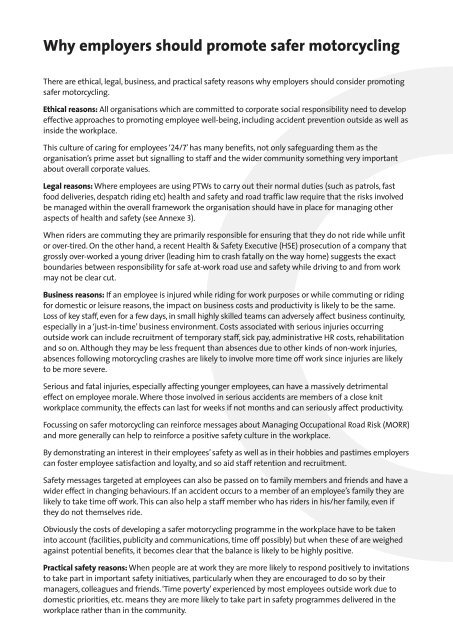Safer Motorcycling Through Work - Network - Motorcycle Action Group
Safer Motorcycling Through Work - Network - Motorcycle Action Group
Safer Motorcycling Through Work - Network - Motorcycle Action Group
You also want an ePaper? Increase the reach of your titles
YUMPU automatically turns print PDFs into web optimized ePapers that Google loves.
Why employers should promote safer motorcycling<br />
There are ethical, legal, business, and practical safety reasons why employers should consider promoting<br />
safer motorcycling.<br />
Ethical reasons: All organisations which are committed to corporate social responsibility need to develop<br />
effective approaches to promoting employee well-being, including accident prevention outside as well as<br />
inside the workplace.<br />
This culture of caring for employees ‘24/7’ has many benefits, not only safeguarding them as the<br />
organisation’s prime asset but signalling to staff and the wider community something very important<br />
about overall corporate values.<br />
Legal reasons: Where employees are using PTWs to carry out their normal duties (such as patrols, fast<br />
food deliveries, despatch riding etc) health and safety and road traffic law require that the risks involved<br />
be managed within the overall framework the organisation should have in place for managing other<br />
aspects of health and safety (see Annexe 3).<br />
When riders are commuting they are primarily responsible for ensuring that they do not ride while unfit<br />
or over-tired. On the other hand, a recent Health & Safety Executive (HSE) prosecution of a company that<br />
grossly over-worked a young driver (leading him to crash fatally on the way home) suggests the exact<br />
boundaries between responsibility for safe at-work road use and safety while driving to and from work<br />
may not be clear cut.<br />
Business reasons: If an employee is injured while riding for work purposes or while commuting or riding<br />
for domestic or leisure reasons, the impact on business costs and productivity is likely to be the same.<br />
Loss of key staff, even for a few days, in small highly skilled teams can adversely affect business continuity,<br />
especially in a ‘just-in-time’ business environment. Costs associated with serious injuries occurring<br />
outside work can include recruitment of temporary staff, sick pay, administrative HR costs, rehabilitation<br />
and so on. Although they may be less frequent than absences due to other kinds of non-work injuries,<br />
absences following motorcycling crashes are likely to involve more time off work since injuries are likely<br />
to be more severe.<br />
Serious and fatal injuries, especially affecting younger employees, can have a massively detrimental<br />
effect on employee morale. Where those involved in serious accidents are members of a close knit<br />
workplace community, the effects can last for weeks if not months and can seriously affect productivity.<br />
Focussing on safer motorcycling can reinforce messages about Managing Occupational Road Risk (MORR)<br />
and more generally can help to reinforce a positive safety culture in the workplace.<br />
By demonstrating an interest in their employees’ safety as well as in their hobbies and pastimes employers<br />
can foster employee satisfaction and loyalty, and so aid staff retention and recruitment.<br />
Safety messages targeted at employees can also be passed on to family members and friends and have a<br />
wider effect in changing behaviours. If an accident occurs to a member of an employee’s family they are<br />
likely to take time off work. This can also help a staff member who has riders in his/her family, even if<br />
they do not themselves ride.<br />
Obviously the costs of developing a safer motorcycling programme in the workplace have to be taken<br />
into account (facilities, publicity and communications, time off possibly) but when these of are weighed<br />
against potential benefits, it becomes clear that the balance is likely to be highly positive.<br />
Practical safety reasons: When people are at work they are more likely to respond positively to invitations<br />
to take part in important safety initiatives, particularly when they are encouraged to do so by their<br />
managers, colleagues and friends.‘Time poverty’ experienced by most employees outside work due to<br />
domestic priorities, etc. means they are more likely to take part in safety programmes delivered in the<br />
workplace rather than in the community.


